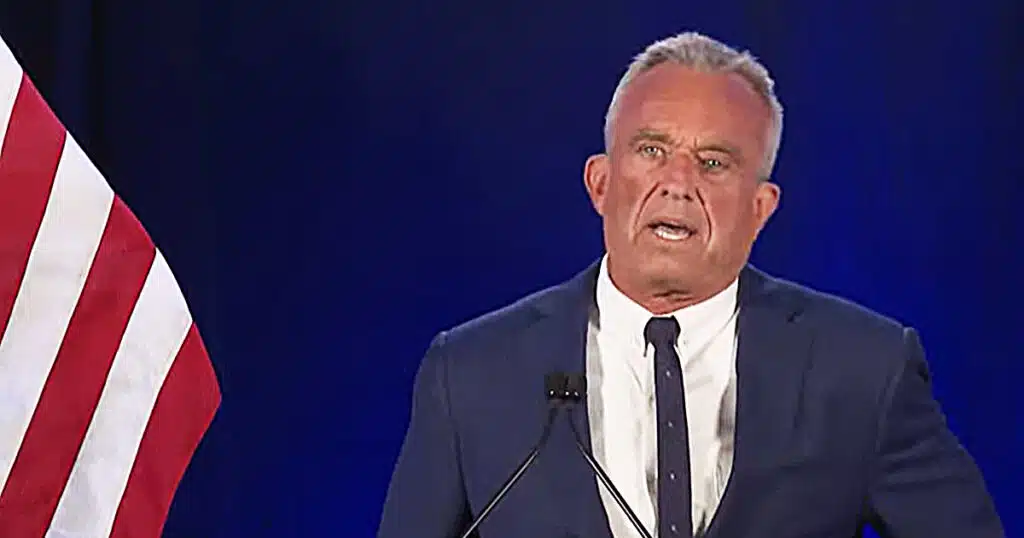
MAHA’s Moment To Prove Itself: The 2026 Midterms
President Trump leafed through the MAHA report moments before its public release, scanning the document that laid the blame for chronic disease in children on everything from ultra-processed foods and a lack of exercise to toxic chemicals and overprescription of medicines.
He asked only one thing when he looked up from his reading: How many of its recommendations could be implemented and how quickly?
Cabinet members replied that they were prepared to move quickly. Trump signaled his satisfaction but, according to sources in the East Room that day last May, delivered a warning. Before staff opened the roundtable discussion to the press, the president told his people, “If you don’t get it done, you’re fired.”
The celebrity president often recycles his famous catchphrase from his era in reality television, but while he became famous for rather unceremoniously firing members of his first administration, he has not given anyone the boot during his second White House season. Whether it was a quip or a threat, the message was received. Trump is serious about cementing the MAHA movement into the greater MAGA coalition, especially before the coming midterms.
Between 4 and 6% of non-Trump voters backed him for the first time last November precisely because he adopted the vow of Robert F. Kennedy Jr. to “make America healthy again.” As Republicans now look down ballot, they hope to bottle that “MAHA bounce” to save their congressional majorities. Sources inside the administration and allies outside of it believe that embracing the movement would not only deliver new voters but also give the GOP a ready answer on how to talk about health care.
“It is just an incredible gift to the Republican Party,” Tony Lyons who now leads MAHA PAC – the political action committee most associated with the movement – told RealClearPolitics. Trump doesn’t believe it came with a gift receipt. He has already embraced, and personally advanced, much of the movement’s agenda.
Trump brought the Presidential Fitness Test back to public schools and advertised the gym exam as “a wonderful thing.” His administration has pressured corporations to ditch artificial food dyes, taken steps to make sugary drinks and soda ineligible for food stamps, and banned the prescription of ingestible fluoride for children. He floated a disputed theory about the connection between the painkiller acetaminophen and childhood autism, telling pregnant women to “tough it out” rather than take Tylenol.
Some of the moves have been more controversial than others. Kenvue, the manufacturer of Tylenol, for instance, disputed Trump’s claim, citing “independent, sound science.” But a senior administration official heralded Trump all the same for “embracing messy conversations around agriculture, vaccines, and pharmaceutical product.” It was evidence, the official told RCP, that the administration is willing to “touch the hot stove” if it means fostering a debate about the health of the nation.
It is also a signal to some health-conscious voters, many of whom voted Democratic prior to 2024, that they have a home in the Republican party. “Right now, these Trump voters – the GOP is just renting them,” Trump pollster John McLaughlin told RCP. Speaking of the coalition Trump cobbled together consisting of disaffected Democrats and traditionally liberal constituencies, he added that Republicans “need to make a decision if they’re going to make them permanent.”
After Trump brought MAHA voters into the fold, according to a senior administration official, the question now is whether “it is a credible statement to say that MAHA is an important tool to broaden the Republican coalition and win future elections.” The GOP will have to swim alone in populist waters someday, the official added, while explaining the urgency on the right to solidify the realignment that Trump achieved in 2024: “There’s a growing sense that we need to have MAGA outlast Trump.” Hence, the efforts to keep MAHA onboard ahead of the midterms.
Republicans are still trying to figure out MAHA. The sentiment is simple enough. The movement is new as a political force and hardly a monolith. It is a patchwork of factions worried about everything from food safety to the pharmaceutical industry. One corner obsesses over the use of pesticides in agriculture. Another focuses entirely on the alleged link between autism and childhood vaccines. To critics, it is a collection of cranks, kooks, and online hustlers looking to earn a quick buck.
But the problems that the movement identifies have been undeniable for some time, even if the MAHA prognosis is not accepted.
“This is about the future of America. We’ve become the sickest, fattest, most disease-ridden nation in the world,” said Gary Brecka, host of “The Ultimate Human” podcast with a following in the millions. “We shouldn’t be proud of the fact that we spend $5 trillion a year on health care, and yet, we lead the world in things like morbid obesity, Type 2 diabetes, and multiple chronic diseases in a single biome.”
That is, not coincidentally, the same conclusion that the MAHA presidential coalition reached in a report authored by Secretary Kennedy. The kids are not all right, the HHS secretary concluded, calling them “the sickest generation in American history.”
“The pandemic rattled the cage of the world and certainly of America,” Brecka told RCP as he explained how the health focus that used to be predominantly a mainstay of blue enclaves like Brooklyn crossed over into red, and often rural, America. As far as the criticism goes, he replied, “The basic premise of science is a hypothesis, which is a question, right? And it’s very fascinating to me, that by asking questions about ‘the science’ that is somehow anti-science, when, in fact, it’s actually the very foundation of science itself.”
Credentialed experts will quibble with, and have already criticized, that sentiment. Those focused on the business of political science, namely winning elections, report that MAHA will be potent in the midterms.
The movement remains popular across the political spectrum, including among Hispanic and black voters, according to a survey conducted over the summer by the Republican polling firm co/efficient. New polling released earlier this month by KFF (formerly Kaiser Family Foundation), meanwhile, found that nearly four in 10 parents, 38%, identify as MAHA supporters. Whether skeptics or disciples of the movement, parents overwhelmingly identified the same set of issues facing children’s health from social media to the prevalence of highly processed foods and the rise of obesity.
Those numbers point to an opening, said Ryan Munce, president of co/efficient. Health care remains a perennial political issue. Republicans are historically very good at articulating what they oppose, namely Obamacare. Opposition to the Affordable Care Act helped sweep GOP majorities into Congress in 2010 and 2014 and Trump into the White House in 2016. Now Munce is encouraging candidates “top to bottom” to embrace MAHA as a positive platform.
“If we don’t have those mid- to long-term solutions to what’s truly not a health care crisis, but a health crisis, in this country, the rest of the conversation about ‘is my premium going to be 10% higher or lower,’ while very important in the everyday,” he said, will obscure “the overall story.” In a word, Munce and other MAHA political operatives told RCP they are stressing something holistic.
Vani Hari agrees. “It is the answer,” she said, “because it’s the preventative answer, the answer to how you get out of a health care system that’s killing you, that’s killing all of us.” A former Democrat who served as an Obama delegate at the 2012 Democratic National Convention, she built a brand as “the Food Babe,” attracting a social media following in the millions with her warnings about ingredients in food she considers toxic. But now it is Republicans, not Democrats, who are scrutinizing the food industry and setting themselves up for political gain, said the woman the New York Times dubbed “the Taylor Swift of the MAHA moms.” Hari describes the current moment, and next November, as “for sure a reckoning.”
The GOP should not take that coalition as a given. While Trump and RFK Jr. have earned their support, Hari said that Republicans down-ballot still need to prove that they are on board. “We are going to do the side-by-side comparison for the candidates,” she told RCP, likening political analysis to the “side-by-side of ingredients” parents do in the grocery store when choosing between brands.
Her question will be, “How MAHA are they?”
The closest thing the movement has to a political nutritionist may be MAHA PAC, a super PAC founded by former RFK Jr. campaign staffers. Lyons, the leader of that organization, insists that the same voters who buoyed Kennedy in the Democratic primary, and later Trump in the general election, are about to prove themselves in the midterms. He believes the administration has delivered “dramatic wins” and made “incredible progress” acting unilaterally from the executive branch.
“But the fight is far from over,” he said. “We need the support of lawmakers to complete the mission, and we can offer our support, backed by millions of voters for whom health is an existential issue and millions of dollars that we’re raising from passionate donors.”
Among the MAHA faithful still waiting for more from Congress is activist Kelly Ryerson, who goes by “the Glyphosate Girl” on social media. The moniker is a reference to a key ingredient in some Roundup weed killers and a chemical culprit in certain cancers. Trump promised to crack down on pesticides. His administration has yet to rein in that industry, a fact that has disappointed some activists. First, the MAHA report seemed to go easy on the issue. Then, House Republicans advanced a spending bill that includes what critics call “a liability shield” for pesticide companies.
More than 200 MAHA activists, including Ryerson, penned an open letter to Trump warning that if Republicans do not crack down, “they risk losing both moral ground and political support.”
They were not subtle. “Mr. President, creating broad liability protections for pesticides is a losing issue for your party and your coalition,” the undersigned added, “and may well cost you the House majority in the midterms.”
Ryerson clarifies that she is thrilled with the president. She met with the EPA, FDA, and USDA during the Biden administration but never saw the same kind of results. She described Trump 2.0 to RCP as “a completely different ballgame” and insisted she still had “confidence that the goal is still to basically detoxify our food system.” Her frustration is with Congress.
And it could boil over.
Ryerson reports that there have been early conversations among some in the MAHA movement about backing primary challengers “to challenge the Republicans who just are not coming along.”
On Capitol Hill, Republicans have played nice with Kennedy. They have mostly welcomed the former Democrat into their ranks. He is, after all, the most popular member of the president’s cabinet at the moment. But the HHS secretary drew the ire of lawmakers with his plan to remake the Centers for Disease Control and Prevention, specifically its vaccine advisory panel.
The MAHA crowd has consistently called for more oversight of vaccines. Some draw a direct link between an increase in childhood autism diagnosis and a vaccine schedule they deem too aggressive, though medical experts widely dismiss that allegation. A clash came in committee last month.
Louisiana Sen. Bill Cassidy, a physician before politics, asked Kennedy if Trump deserved the Nobel Prize for Operation Warp Speed, the pandemic-era project that developed a COVID-19 vaccine in record time and has been credited with saving millions of lives. The HHS secretary said yes. Why then, alleged Cassidy, had he consistently opposed mRNA technology both as a private attorney and a public servant?
“As lead attorney for the Children’s Health Defense, you engaged in multiple lawsuits attempting to restrict access to the COVID vaccine,” Cassidy said. “It surprises me that you think so highly of Operation Warp Speed when as an attorney, you attempted to restrict access to the COVID vaccine.”
Kennedy countered that the COVID vaccine was effective against a particular mutation of the virus at a particular moment in time and noted that Trump had never supported a mandate. Cassidy then read from a letter from a medical colleague detailing confusion over which patients ought to receive the COVID shot. The FDA had just approved an updated vaccine for anyone age 65 and older, and any child six months or older with an underlying health condition that places them at increased risk of the virus.
“I would say effectively we are denying people vaccine,” the senator said.
“You’re wrong,” the secretary replied.
Cassidy was not the only Republican to voice displeasure. Wyoming Sen. John Barrasso, a physician and the second-ranking Republican in the upper chamber, reminded Kennedy that “in your confirmation hearings, you promised to uphold the highest standards for vaccines.” The changes Kennedy had made at HHS and CDC, he concluded, had left him “deeply concerned.”
It was a rare flashpoint between the administration and a generally accommodating Congress. But it isn’t likely to inspire Republican-on-Republican violence. Republican incumbents can breathe a sigh of relief as far as MAHA PAC is concerned. Lyons told RCP his organization isn’t looking to help mount a challenge from their flanks. He said that it wouldn’t be “the right move” for MAHA to tell lawmakers that “we’re going to primary them if they don’t do this or that.”
The political message of MAHA, according to Lyons, is that the coalition wants “to educate people and we want them to see the enormous potential for winning in the midterms based on this issue.”
Tension still lingers under the surface as the realignment continues. Asked about the criticism from Barrasso and Cassidy, a senior administration bristled to RCP that the pair “have been accepting pharmaceutical donations all their life.”
A Barrasso spokeswoman flatly dismissed that criticism, noting that the majority whip helped rally Republican support for Kennedy’s nomination both in committee and on the floor. They added that the senator-physician “has always been pro-vaccine but anti-mandate,” a position “no different” than that of Trump. Cassidy similarly voted for Kennedy and has also publicly praised several MAHA initiatives from getting petroleum-based dyes out of foods to demanding additional accountability from the pharmaceutical industry.
Cassidy and Barrasso introduced a resolution earlier this week to nominate Trump for the Nobel Peace Prize for launching Operation Warp Speed. The MAGA crowd would love to see Trump win, but they have largely soured on the product of that initiative.
Recent polling from the president’s own pollster, Tony Fabrizio, found that just 22% of Trump voters now believe it is currently “important” to receive the COVID jab. They are, however, overwhelmingly supportive of vaccines in general. A clear majority of Trump supporters, 73%, agree with the sentiment that “vaccines save lives.”
Trump still brags about Operation Warp Speed. He recently called it “one of the greatest things a president has ever done for this country, and you could say the world.” According to a report by the White House physician when Trump underwent a physical at Walter Reed Medical Center this month, he received the flu shot and a COVID-19 booster shot.
Democrats are already looking forward to the midterms and probing for fractures in the MAHA-MAGA alliance. Many of those voters, after all, once called the Democratic Party home.
“Trump and RFK Jr. are actively putting Americans at risk. They’ve alienated huge swaths of Americans by making it harder to get popular and safe vaccines, shamed pregnant women for using Tylenol, and disregarded the advice of doctors and medical experts,” said DNC spokeswoman Kendall Witmer. “Meanwhile, Trump and RFK Jr. have broken key promises they made to the MAHA movement on everything from pesticides to pollution to childhood diseases,” she added. “With the midterms approaching, the coalition that put Trump in office is falling apart, as Trump and RFK Jr. become a liability to Republicans down ballot.”
Some friction is to be expected between the GOP and the various MAHA sects. Ryerson chalked up the disconnect to a generational and ideological divide. Younger, health-forward voters recently brought into the Republican fold will have their differences with the old guard. But they aren’t likely to break with the right so long as Kennedy is at Trump’s side.
“Each time there is a hearing, and you see Democrats just tear RFK Jr. apart,” Ryerson said, “it is a good thing for Republicans.” This provides an opportunity for the GOP to reprise their role, she said, as “the MAHA component.”
And in this way Trump hopes to cement that part of his winning 2024 coalition into the fabric of his newly realigned party. White House spokesman Kush Desai reiterated that Trump has “full confidence” in Kennedy and endorses the overall mission of MAHA.
“The MAHA Agenda isn’t just a set of federal policy proposals, but a grassroots movement that’s revolutionizing the health decision-making of food companies, restaurant chains, and everyday Americans,” Desai said. “The administration is committed to building on this movement and uniting the Americans who want to restore American Greatness in every sense.”
Ahead of the midterms, if some get their way, this means adopting the MAHA message as the GOP answer on health care.
This article was originally published by RealClearPolitics and made available via RealClearWire.



